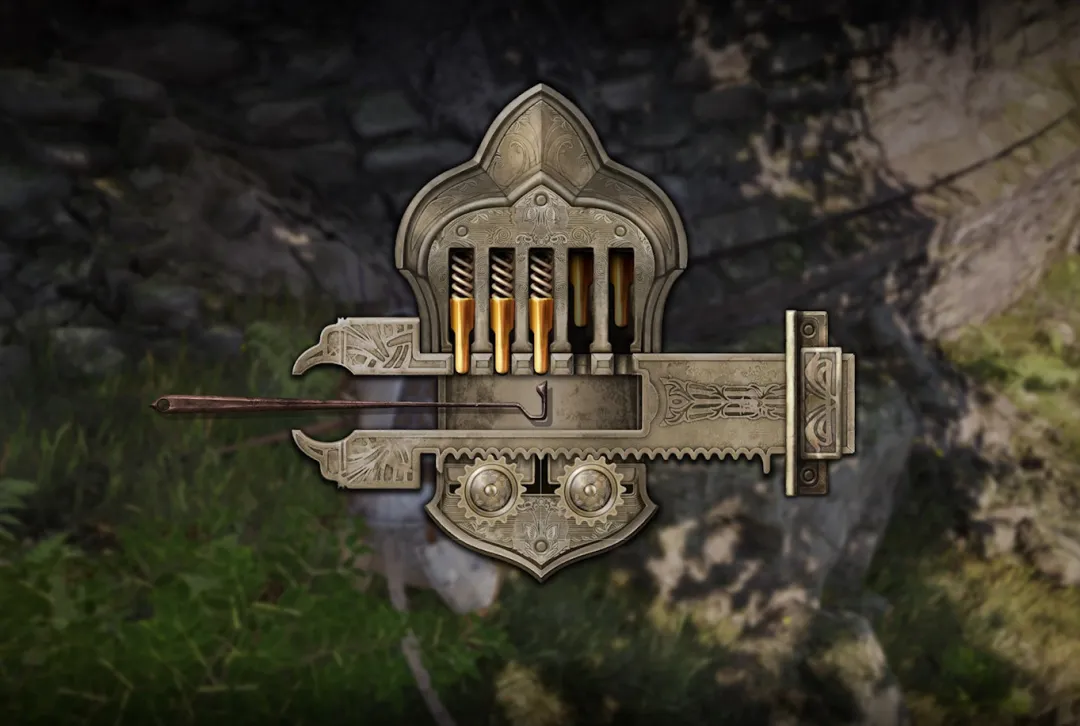Oblivion lockpicking and progression systems
The Elder Scrolls IV: Oblivion has a lockpicking mini-game. When you encounter a locked chest or a door, you whip out your lockpick and try to set the lock pins in the right position. There’s some intuition to it, and you get better as you play. But here’s the kicker: as your character’s in-game skill increases, the number of tumblers you have to interact with decreases, significantly simplifying the mini-game. So, as you, the player, get better at the mechanic, the game itself gets easier.
This illustrates a core design tension. There’s nothing wrong with easy games, but when a player engages with a mechanic over a long time, they obtain a degree of mastery. Taking that mechanic away or simplifying it removes the satisfaction of getting better at things. The Oblivion example is particularly egregious because one fairly easy-to-find Daedric quest reward—an unbreakable lockpick—allows you to skip the mini-game completely, forever.
 Oblivion lockpicking mini-game isn’t particularly engaging or fresh, but removing it altogether after spending time getting better at it doesn’t feel right.
Oblivion lockpicking mini-game isn’t particularly engaging or fresh, but removing it altogether after spending time getting better at it doesn’t feel right.
Skyrim improved this slightly; the unbreakable lockpick is a temporary item you must relinquish to progress the Thieves Guild storyline. Still, the underlying issue remains: the mini-game gets easier as your player skill grows. Instead of an increased or more engaging challenge, a skilled player is “rewarded” with a trivial task.
Rewarding mastery with obsolescence isn’t limited to mini-games. Look at the ever-present outpost clearing in a Far Cry titles. What starts as an engaging, calculated stealth section, where every move must be carefully planned, often devolves into a guns-blazing bullet storm as your character becomes a walking tank. While fun in its own right, it’s a completely different gameplay loop and hardly a worthy reward for players who enjoyed mastering the stealth approach.
A similar fate befalls the otherwise brilliant Nemesis System in Shadow of Mordor and its sequel, Shadow of War. The initial push and pull between you and the orc bosses is thrilling. Will you defeat your nemesis, or will they get the better of you again? But the system loses its shine once the player levels up enough. Talion becomes so much more powerful than the enemies that the encounters become one-sided. You’ll almost always win, and the system’s primary appeal fades.
Now let’s be clear, game designers aren’t fools. The Elder Scrolls games aim to be widely accessible, and letting the players of all skill level feel the sense of overcoming the challenge. Rogue-lites introduce incremental progress to stop players from feeling like they’re banging their head against the wall for dozens of hours. And for many players, skipping the tedious lockpicking mini-game can be its own reward. But then why put a tedious mini-game into your title to begin with?
When it comes to clearing Far Cry outposts, many players will deeply enjoy the sense of progression - where you had to hide and pick out enemies one-by-one, you’re now the main threat. That feels cool and rewarding in its own way. And having Talion dispatch his enemies with ease feels like a satisfying arc to his character.
This tension between player skill and character power is why I often love roguelikes but dislike “rogue-lite” games with cross-run progression. When running through levels in Hades or Dead Cells, I’m forced to ask: am I actually getting better at the game, or do I just have better gear and skills unlocked? The progression system masks a lack of genuine player improvement.
So, how can progression systems honor player investment instead of undermining it? Some games get this right. Sifu, for instance, handles its progression beautifully by unlocking new moves that, while providing advantages, demand significant additional skill to use effectively. Here, the reward for mastery is a deeper, more complex challenge.
FromSoftware titles like Dark Souls and Elden Ring also navigate this, albeit differently. These games are known for letting you control the difficulty through gameplay choices: magic can be easier than melee, summons can help you win tough fights, and yes, grinding levels will make the game simpler. However, this is almost always a conscious choice left to the player—an optional reprieve rather than a mandatory simplification.
Metroidvanias like Hollow Night are the masters of progression that changes gameplay and opens up new paths through the game. New tools in these games increase the complexity of the game rather than reduce it. How cool it would’ve been to get a more complex lockpicking mini-game in Oblivion as you reach higher levels of mastery (with suitable rewards behind the locked doors, of course)? While these games deepen the existing vertical progression, other titles sidestep the problem entirely by focusing on horizontal progression. Games like the Monster Hunter series, for example, offer new gear that provides different strategic options rather than just raw power, respecting player choice and skill above all.
I think game designers can focus on a few core principles for designing better progression systems:
- Prioritize adding new mechanics over buffing existing numbers.
- Link progression to new systems that require learning, not just using an “I win” button.
- Use progression to re-contextualize old areas and challenges, rather than just letting the player bulldoze through them.
Ultimately, the most satisfying progression systems are those that respect a player’s growing mastery by deepening the challenge or expanding their expressive options, not by simply removing the challenge altogether.
Comments
Respond directly on Bluesky (threads shown below) or Medium (view comments there).
 Rooslawn's Unmapped Worlds
Rooslawn's Unmapped Worlds